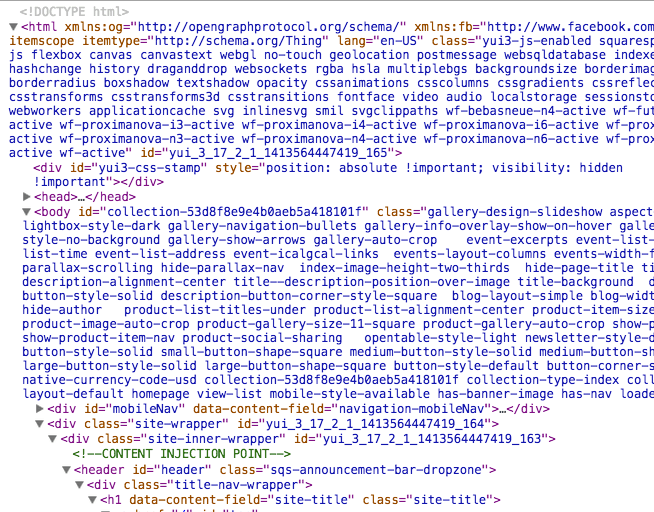Rise of the Static Centric CMS
October 17, 2014The Browser has the power
Over the past few years more dynamic logic has been moving into the browser. With the advent of JS frameworks and the huge array of widgets for everything from comments to calendars, more can now be achieved without the need of your own backend server. Even if you do need your own datastore there are tools to help you out. The frontend landscape today is frickin' amazing.
The story of a website
A client walks in an Agency’s door and explains they need a website for their business that has a professional design, conveys their message, and allows them to reach their audience through blogging. The Agency creates a beautiful design that the client loves.
The Agency then takes their beautiful design, shoves it into a popular DB driven CMS, deploys it, and hands a login to the client. After all is said and done the site loads like an injured slow loris.

The markup has enough extra weight to anchor down the RMS Queen Mary 2.

I might be over exaggerating a little here but for those of us that value fast, semantic, and clean websites, are we okay with this? Are we doing our clients a disservice by producing sites like this? Can we do better?
Rise of of the SSG, sort of
Along with the proliferation of javascript technologies, more developers and designers have been using static site generators for their own use. There are a ton of options. This very site is built with a tool called Jekyll. I won’t dive into the details of why SSG’s are great, but a summary includes fast load times, semantic markup, complete template control, simple deployment, version controlled, etc.
As cool as SSG’s are they lack in one core area, content management for the non techie. For a designer/developer editing source files is no problem. For clients it is impossible. You will find this exact frustration with a little searching. Here, here, here, and here are just a few examples.
So how do we utilize all of the great things SSG’s provide us but still make editing content accessible to clients that own these sites?
Some people have already solved this in their own ways. The team at dojo4 created their own tool chain and Development Seed created a tool called Prose that allows easier editing of content in a GitHub repo.
I want all the things
The tools mentioned above are great and solve problems for those teams, but why can’t we have it all? Imagine creating beautiful handcrafted websites with complete design freedom. Imagine that these fast and semantic sites are easily deployed to a global CDN. Imagine that you can implement custom data types just like you would do in other traditional CMSs. Imagine that your clients can access these sites and manage the content/data that you allow them to manage. Nothing less, nothing more. Imagine that this all works seamlessly in one system.
I don’t want us to imagine this. I want us and our clients to have this.
We can make it happen
In a debate this year regarding flat file cms systems one comment really stood out:
"Now that we're on the topic of flat-file CMS, can somebody name one with an admin panel where the compilation is actually done on the server? I like the idea of serving static content and having very very simple templates, but I can't convince casual users to install one of these tools and all the dependencies, write markdown, compile and upload or push to a repo, it's way too complicated for them. It shouldn't be too hard to have a simple admin form and trigger the compilation on the server, right after the user saves a post. Right?" - MatekCopatek
This comment is right on but it is up to us to make this happen. I propose we build on top of some successful SSG’s and bring their power to our clients. With new static centric deployment solutions emerging, like Bitballon, we can create some interesting products. Here is to a new breed of CMS, a static centric content management system*. Let’s get to work!
Get in touch
We're very interested in speaking with developers who currently use Jekyll. Please let us know your thoughts on this post: hello@320ny.com
* Static Centric Content Management System (SCCMS) is a flat-file content management system that produces a completely static site to be served.
Follow Up
One platform I did find is getting pretty close. It’s called siteleaf.com. The major drawback is that they seem to have created their own SSG and it is not up to par with many open source alternatives. It’s simple, static, and easily deployed but it might be too simple.
Need Squarespace help? Need member logins for Squarespace?
Click here to be notified about new useful links.
